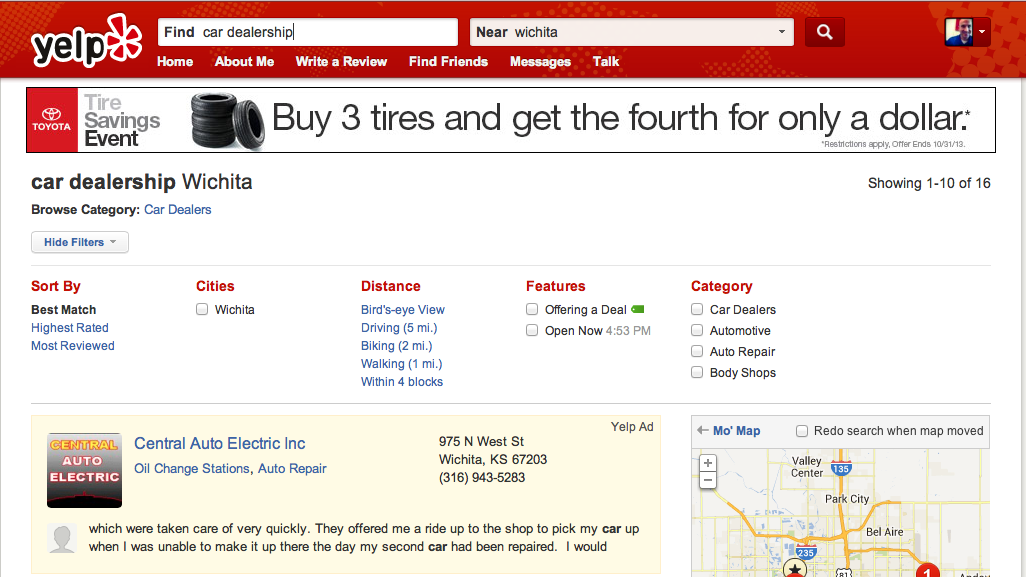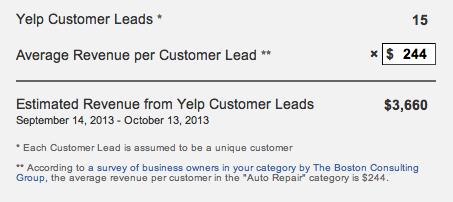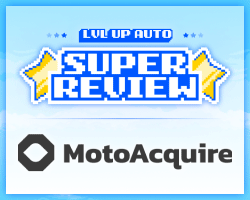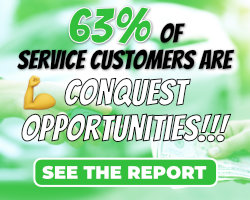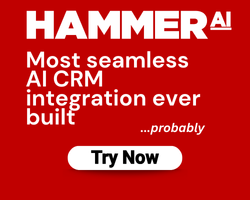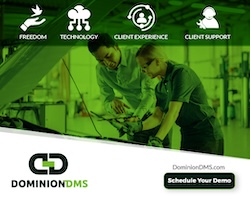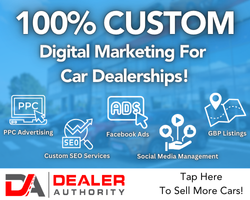Dylan Swift, Yelp’s Director of National Marketing, spoke this morning at the Driving Sales Executive Summit to a predictably tepid audience. The presentation included a lot of the same old statistics we’ve seen about the rise of mobile trends, and then abruptly ended.
Charlie Vogelheim, looking dashing in his velvet tuxedo jacket, asked a few questions and then invited the audience to submit questions on pieces of paper for Mr. Swift to answer. My question was the last one read, but due to time constraints, Charlie had to paraphrase, and Mr. Swift didn’t address any of the points satisfactorily. So, I’ll try here on DealerRefresh.
I’ll begin with a story…
A few weeks back, a friendly young woman called from Yelp’s advertising department to check in with us. I’d spoken with another rep last year about possibly partnering with them, but ultimately we decided against it, and this rep wanted to know if we’d give it another look.
I reminded her that I’d sat through the presentation once before and asked if enough had changed in the last year to make it worth sitting through again. She assured me that Yelp makes significant updates almost weekly, so I agreed.
Spoiler alert–I said no. Again. Not because it wasn’t the right time, the right “fit,” or that I was a few dollars short of seeing the full value of the package, but because there was just so much wrong with the presentation, I decided to write this review.
It’s important to note that I’m writing this article from the perspective of one in Wichita, Kansas, where Yelp just hasn’t taken hold like it has in larger cities. Out of all the years that Suzuki of Wichita was around, we managed to collect a whopping 2 reviews on the main page and 5 reviews that were trapped by the infamous Yelp filter. Sure, some restaurants, bars, and retail stores have collected reviews numbering in the double digits (such as this restaurant that briefly rose to notoriety for serving lion meat) but overall, Wichitans just don’t Yelp that much.
I’m going to assume that you know the basics of what is included in the Yelp advertising package–certainly enough has been written about it by now. You receive features like an enhanced business profile with a video (which they arrange to produce for you) and photo slide show, a Call to Action Button, Yelp Deals, as well as a promised amount of ad impressions (yes, that’s impressions, not clicks) at the top of the search results page and competitors’ profiles on both desktop and mobile.
As with last year’s presentation, I was sent an email with a collection of links to click through as the ad rep spoke. The first link was to Google Trends, which showed the upward climb of Yelp’s use over the last five years. The second link pointed to a Bloomberg Businessweek article published on April 7, 2008.
Red flag. It goes without saying that, in internet time, 5+ years is an eon. What is the message that such an article sends, especially at the beginning of a presentation? Hasn’t anything else positive been written about Yelp in the last five years?
The next link that was included is this article published on DrivingSales in 2011. The main question that the article asks is whether or not to use Yelp at all, and the author doesn’t speak from a standpoint of having actually benefitted (or used, for that matter) the ad package. Is this the best piece of content they could find about the use of Yelp in the car business, or did they assume I’d be impressed enough by the fact that it was published on Driving Sales?
This is a great reminder that a piece of content written for use in our retail auto “community” could be incorporated into a national advertising strategy.
Yelp prides itself on being a search engine for low-funnel shoppers ready to make a decision. If this is so effective, then why are the ads served up in the Wichita area only marginally relevant?
For example…
I love how “Sort By Best Match” is highlighted. So, the best match for a “car dealership” near Wichita is an auto electric provider? Now, I’m willing to forgive the fact that maybe there just aren’t any more relevant ads to serve up. The problem is, Yelp promises a number of impressions based on your monthly fee, and I can’t help but think that this particular impression was counted as one of those promised in the ad package.
Worst of all are the Business Owner Analytics. I check in to the dealership every day on Yelp, but these check-ins are counted as individual customer “leads,” a number which the ad rep tried very hard to sell me on.
In the last 30 days, I’ve checked into the dealership exactly 15 times. Yes, I do keep track of this.
Notice the first asterisk at the bottom. It says Each Customer Lead is assumed to be a unique customer. Strangely, the ad rep I spoke with was unaware of this “assumption.” Hmmm…
I can’t help but conclude that, at best, the Yelp advertising presentation is outdated, misleading, and condescending. Pair that with the fact that you have to sign a 12 month contract to get started, and you’ve got a definite NO.
Fast forward to DSES. I knew there wouldn’t be enough time to address all of these points, so I wrote down my top three questions, which went unanswered today because Mr. Swift was saved by the bell. The questions were:
1. Why are advertisers required to sign a 12 – month commitment?
2. Why are ad impressions so expensive — easily among the most expensive on the web?
3. Why are you unable (or unwilling) to differentiate between unique and non-unique mobile check-ins?
What question for you have for Yelp?
Ask away in the comments below!



